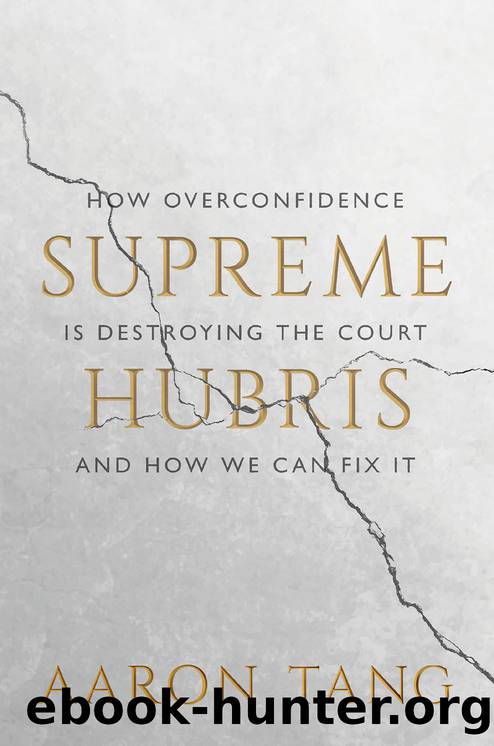Supreme Hubris by Aaron Tang

Author:Aaron Tang
Language: eng
Format: epub
ISBN: 9780300264036
Publisher: Yale University Press
7
Rebuilding Trust
The most unexpected moment in my year clerking at the Supreme Court happened in the middle of an oral argument. It did not involve a gotcha question from one of the justices or some eloquent speech made by an oral advocate. It did not even involve a particularly noteworthy case.
Near the end of the oral argument in a dry dispute over attorneysâ fees in patent cases, a man stood up in the public audience section at the back of the courtroom. But he did not shuffle quietly out of the room, as courtroom officials and other audience members expected. He stood there waiting, almost respectfully, for a pause in the back-and-forth between the justices and the lawyer at the podium.
Then, he spoke.
âI rise on behalf of the vast majority of the American people who believe that money is not speech, corporations are not people, and our democracy should not be for sale to the highest bidder! Overturn Citizens United!â
A swarm of Supreme Court police officers rushed to arrest the man. The justices watched with visible discomfort, uncertain whether he had been acting alone. (A second protester was indeed in the room covertly videotaping the event, against the Courtâs official rule forbidding cell phones, but he never revealed himself. The following year, eight protesters would interrupt another oral argument session by chanting, one after the other, âOverturn Citizens United!â and âMoney is not speech!â)
Order was eventually restored, and Chief Justice Roberts cracked a joke. The oral argument resumed. Evidence of the protest was eventually expunged from both the oral argument audio file and the official Court transcript. To anyone who hadnât been there, it might have seemed as though nothing unusual had ever happened.
Yet when the argument ended, an excited murmur filled the courtroom. Two things were clear to everyone in attendance. First, we had just witnessed a historic moment: a rare public disturbance of the Supreme Courtâs solemn and methodical mode of conducting business. And second, many people were not happy about Citizens United. Not one bit.
To understand the publicâs outrage over Citizens United is to understand the first of three important reasons why the least harm principle can rebuild public trust in the Supreme Court. The problem with the decision wasnât simply that many people consider it deeply harmful to our democracy. The problem was also that the Court left the public no way to avoid those harms.
In September 2009, Gallup surveyed the American public about their impressions of the Supreme Court. A near record-high 61 percent of respondents reported approving of the Courtâs work.1 Three months later, the Court held in Citizens United that corporations enjoy a First Amendment right to make unlimited expenditures out of their general corporate treasuries to influence elections.
The following September, Gallup conducted another poll. It found the Courtâs approval rating had dropped by a staggering ten points. Thereâs little mystery as to why: the public was deeply upset about Citizens United and its implications for our democracy. Eighty percent of Americans, including overwhelming majorities in both political parties, opposed the ruling shortly after it was issued.
Download
This site does not store any files on its server. We only index and link to content provided by other sites. Please contact the content providers to delete copyright contents if any and email us, we'll remove relevant links or contents immediately.
| ASVAB | GED |
| GRE | NCLEX |
| PRAXIS | SAT |
| See more | Flash Cards |
| Study Guides | Study Skills |
| Workbooks |
Talking to Strangers by Malcolm Gladwell(13370)
The Compound Effect by Darren Hardy(8965)
Tools of Titans by Timothy Ferriss(8393)
Wonder by R. J. Palacio(8108)
The Lover by Duras Marguerite(7901)
A Court of Wings and Ruin by Sarah J. Maas(7844)
The Circle by Dave Eggers(7112)
Deep Work by Cal Newport(7083)
Kaplan MCAT General Chemistry Review by Kaplan(6933)
To All the Boys I've Loved Before by Jenny Han(5848)
Wiseguy by Nicholas Pileggi(5782)
The Body: A Guide for Occupants by Bill Bryson(5096)
Eat That Frog! by Brian Tracy(4536)
1,001 ASVAB Practice Questions For Dummies by Powers Rod(4503)
Cracking the GRE Premium Edition with 6 Practice Tests, 2015 (Graduate School Test Preparation) by Princeton Review(4291)
Pre-Suasion: A Revolutionary Way to Influence and Persuade by Robert Cialdini(4232)
Barron's AP Biology by Goldberg M.S. Deborah T(4150)
ACT Math For Dummies by Zegarelli Mark(4047)
Alive: The Story of the Andes Survivors by Piers Paul Read(4031)
